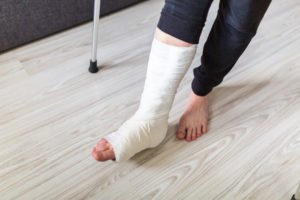
If you suffered injuries on someone else’s property, you might wonder what the difference between a premises liability and slip and fall case is. A slip and fall case is a type of premises liability claim.
Premises liability cases are personal injury claims where the at-fault party is responsible for an accident and a plaintiff’s injuries. In premises liability cases, the negligent party can be the property owner, landowner, or property manager. If the accident happened on government property, the government can potentially be held responsible.
Examples of Premises Liability Cases
Premises liability cases typically arise when a property owner fails to remedy an unsafe condition on their property. Examples of premises liability can be:
Slip and Fall Accidents
A slip and fall accident can happen almost anywhere, for example in restaurants, hotels, parking garages, or shopping malls. If you slipped and fell due to a hazardous condition, such as broken flooring or spillage on a floor, you might have a case against a property owner.
Negligent Security
A business owner or property owner may be liable for a plaintiff’s damages under the premises liability law if a property owner failed to provide adequate security on their premises and the plaintiff suffered an attack or robbery. This can particularly be the case when incidents have happened on the property before. The costs of injuries and violence can be steep. The Centers for Disease Control and Prevention (CDC) state that medical and work-loss costs of injuries and violence amounted to $671 billion in 2013.
Dog or Animal Attacks
Dog bites can, in some cases, fall under premises liability laws. For example, if a property owner is aware that a tenant owns a dangerous dog that has attacked other tenants, and does nothing to enforce rules of the premises, they may be liable for any damages to victims.
Exposure to Toxic Chemicals
Exposure to toxic substances and chemicals can be a premises liability case. If you have been exposed to toxic substances such as asbestos, pesticides, chemical solvents, mold, and others, a property owner may be liable for your injuries. A property owner may be negligent if they did not follow the laws for safekeeping or safe storing of the substances, for example.
Electrical Accidents
Electrical accidents can also fall under premises liability laws, for example, in cases where injury or death occurred due to exposed or faulty wiring.
While there can be different instances of premises liability claim, the owner of the property is responsible for keeping their guests, invitees, and patrons reasonably safe.
Proving Negligence in Premises Liability Cases
State laws and the Federal Torts Claim Act address the responsibilities of property owners, and in general, a property owner has to maintain a property to a reasonably safe standard. If you or a loved one suffered injuries due to a property owner’s carelessness, you could potentially recover compensation. However, you will need to prove that the property owner is responsible for your accident, injuries, and damages.
This may present the sticking point in premises liability cases as litigation of these claims can be challenging. However, you do not need to struggle with the legal intricacies on your own. A premises liability lawyer can help assess your claim, collect evidence, and build your case. You and your lawyer will want to prove several elements in a premises liability case, for example:
- The defendant owned, occupied, managed, or leased the property and was therefore responsible for maintaining the premises to a good standard.
- The defendant was negligent in maintaining the property, causing a dangerous condition, or failing to remedy a hazardous condition.
- You suffered harm and damages as a result.
In a premises liability case, you will need to present evidence to prove and strengthen your case. This could be photographs of the unsafe condition, witness statements, and your medical bills, among other evidence.
Ben Crump Law, PLLC Can Help You
If you are wondering what the difference of premises liability and slip and fall accidents is, we can answer that question and any others you might have about your slip and fall accident. If you or a loved one suffered any injuries on someone else’s property due to negligent maintenance or another reason, you could potentially hold them to account and recover compensation. We can help you in the following ways:
- Analyzing and building your case
- Calculating your damages
- Gathering the evidence
- Proving negligence
- Negotiating with insurances
- Representing you in court
Premises liability cases can be challenging, but we are not afraid to stand up to a powerful property owner or company on your behalf. You do not have to pay any up-front lawyer’s fees when you work with us, as we only get paid if and when we win your case.
Contact Ben Crump Law, PLLC today for a free evaluation of your case by dialing (855) 933-4005.




